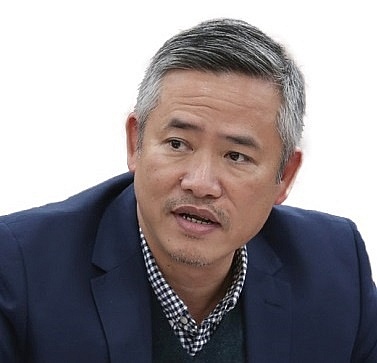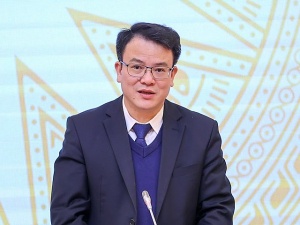Consistency required for developing chip industry
At present, there is a clear assignment of duties assigned by the government to support the development. Specifically, in terms of human resources training, the government assigns the Ministry of Planning and Investment (MPI) to implement manpower training activities. We cannot develop the industry without a qualified workforce.
 |
| Dam Bach Duong, director, High-Tech Department Ministry of Science and Technology |
The government has assigned the Ministry of Information and Communications (MIC) to implement the semiconductor chip development strategy.
The Ministry of Science and Technology (MoST) is assigned to focus on research activities to connect the following stages. Among the ministry’s activities, there includes the national product programme in which semiconductor chips are on the list of national products. Currently, the ministry is actively carrying out tasks related to the study, design and manufacturing of semiconductor chips.
We are also working with the MPI and MIC on developing manpower and the semiconductor industry.
At a meeting held in January to review the coordination programme between the MoST and the Ministry of Defence, Viettel proposed to the MoST that the company was also interested in a chip project and hopes to work with the ministry on it.
The MoST and Viettel are preparing meetings with the aim of jointly working on special policies to solve problems related to chips. As semiconductors are a specialised product, just applying existing policies makes it difficult to develop the industry.
We and Viettel now have specific schedules to work with each other, and then propose them to the government and higher agencies.
The development of the semiconductor chip industry is a global trend. Many countries have strengthened their cooperation with Vietnam to a higher level. Therefore, the semiconductor chip industry promises growth potential.
The industry comprises three main activities: design, manufacturing and packaging. Where Vietnam is in this chain. Vietnam is doing packaging, but chiefly through supporting industries for packaging.
Many experts believe that Vietnam should focus on design only. Meanwhile, the supporting industry for packaging should be developed into the packaging industry. We now have around 5,000 engineers, mostly focusing on chip design.
Meanwhile, many other experts have said that Vietnam should learn lessons from Taiwan, which invests in chip manufacturing. And the world is queuing to buy Taiwanese semiconductors. However, manufacturing is costly in terms of investment and human resources.
We have good international cooperation. Many big investors from developed markets like the US, Japan, and Taiwan are interested in making investments in the semiconductor manufacturing in Vietnam.
Work is being done to create better conditions to promote the development of the industry. There will also be sci-tech programmes related to this. We are studying this and will consult the government so that it has the right direction to develop the industry based on the local context and resources so that we can go move efficiently.
At present, we have not had consistent policies which include special incentives for the development of the semiconductor chip industry. Now, the policies related to semiconductor chips are scattered in different documents.
For example, in the high-tech industry, chips are in the list of high-tech products prioritised for development. This means investors can enjoy certain incentives. However, for activities like research, semiconductors are not in the list of national products which enjoy other certain incentives.
It is expected that in the strategy and plan on semiconductor development that the government assigns to the MPI and the MIC, there will be tasks on developing policies so we have consistent and specialised ones to encourage and to create the best policies conditions for businesses and organisations to join research, design, and manufacturing activities in the upcoming time.
 | Vietnam targets key sectors to cement status as prime investment destination To bolster its position as a hub for investment, Vietnam continues focusing on three key areas land infrastructure, human resources, and institutional reform, according to Deputy Minister of Planning and Investment Tran Quoc Phuong. |
| Semiconductor development surge keenly anticipated Vietnam will look to build on its semiconductor diplomacy with the formulation of a strategy on developing the much-needed products. |
| Supporting industry required for semiconductors Experts are warning that Vietnam’s semiconductor industry can strongly develop only when it has a supporting industry. |
What the stars mean:
★ Poor ★ ★ Promising ★★★ Good ★★★★ Very good ★★★★★ Exceptional
Related Contents
Latest News
More News
- Masan Consumer names new deputy CEO to drive foods and beverages growth (February 23, 2026 | 20:52)
- Myriad risks ahead, but ones Vietnam can confront (February 20, 2026 | 15:02)
- Vietnam making the leap into AI and semiconductors (February 20, 2026 | 09:37)
- Funding must be activated for semiconductor success (February 20, 2026 | 09:20)
- Resilience as new benchmark for smarter infrastructure (February 19, 2026 | 20:35)
- A golden time to shine within ASEAN (February 19, 2026 | 20:22)
- Vietnam’s pivotal year for advancing sustainability (February 19, 2026 | 08:44)
- Strengthening the core role of industry and trade (February 19, 2026 | 08:35)
- Future orientations for healthcare improvements (February 19, 2026 | 08:29)
- Infrastructure orientations suitable for a new chapter (February 19, 2026 | 08:15)

 Tag:
Tag:



















 Mobile Version
Mobile Version